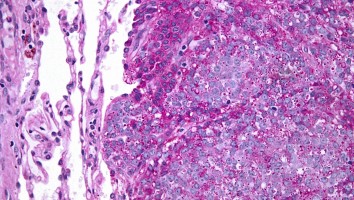
A new research paper was published in Genes & Cancer on December 14, 2022, entitled, “Slit2 signalling stimulates Ewing sarcoma growth.”
Ewing sarcoma is a cancer of bone and soft tissue in children driven by EWS::ETS fusion, most commonly EWS::FLI1.
Because current cytotoxic chemotherapies are not improving the survival of those with metastatic or recurrent Ewing sarcoma cases, there is a need for novel and more effective targeted therapies.
While EWS::FLI1 is the major driver of Ewing sarcoma, EWS::FLI1 has been difficult to target.
“A promising alternative approach is to identify and target the molecular vulnerabilities created by EWS::FLI1.”
In this recent study, researchers Kruthi Suvarna, Panneerselvam Jayabal, Xiuye Ma, and Yuzuru Shiio from The University of Texas Health Science Centre report that EWS::FLI1 induces the expression of Slit2, the ligand of Roundabout (Robo) receptors implicated in axon guidance and multiple other developmental processes.
“Using secretome proteomics, we found that EWS::FLI1 induces the expression of Slit2. We demonstrate that EWS::FLI1 binds to the gene promoter of Slit2 and activates its expression.”
EWS::FLI1 binds to the Slit2 gene promoter and stimulates the expression of Slit2. Slit2 inactivates cdc42 and stabilises the BAF chromatin remodelling complexes, enhancing EWS::FLI1 transcriptional output.
Silencing of Slit2 strongly inhibited anchorage-dependent and anchorage-independent growth of Ewing sarcoma cells.
Silencing of Slit2 receptors, Robo1 and Robo2, inhibited Ewing sarcoma growth as well.
Their results uncover a new role for Slit2 signalling in stimulating Ewing sarcoma growth and suggest that this pathway can be targeted therapeutically.
“Ewing sarcoma’s dependence on Slit2 signalling provides an excellent opportunity for therapeutic targeting. While a pharmacological inhibitor for Slit – Robo signalling is not yet available, a radioactively labelled anti-Robo1 monoclonal antibody was shown to suppress xenograft tumour growth of hepatocellular carcinoma cells and small cell lung cancer cells, suggesting that it is feasible to target the Slit – Robo pathway. Therapeutic targeting of Slit2 - Robo1/2 signalling singly or in combination with that of NELL2 - Robo3 signalling in Ewing sarcoma warrants further investigations.”
Article: Slit2 signalling stimulates Ewing sarcoma growth
Source: Impact Journals LLC